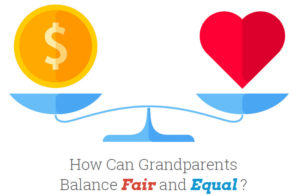by Grant Goodvin
We grandparents stand on the top of a generational gold mine: our families. As we go about trying to encourage and bless our children and grandchildren, there’s one question that we nearly always struggle with:

How can I be fair to everyone?
For example, there are numerous everyday decisions that have us doing mental gymnastics, such as birthday gifts. The discussion goes something like this:
Let’s see, we bought grandchild A this gift on her birthday. How can we make sure the gift for grandchild B is fair by comparison?
Many times, we are looking only at the amount of money spent. If we spent $20 on grandchild A, then spending $20 on grandchild B would be fair.
This works pretty well when the children are younger. However, as they grow older, their stage of life starts to enter the equation, causing more difficult questions. Is it fair to spend the same amount on gifts for a 10-year-old grandchild as we do for a 20-year-old? And this is only in the realm of birthday or Christmas gifts.
The unspoken rule we apply is that, in order to be fair, we have to be equal in the gifts we give to each grandchild.
And there are many other areas we evaluate in a similar way, such as: clothing, health needs, electronics and entertainment, education, location, and estate planning. However, each category has dynamics that severely challenge that “fairness rule,” and it goes beyond the money we spend.
Think of location. How can a grandparent spend equal time with his or her grandchildren when some of them live nearby and some live a great distance away? We can quickly admit that there is no way the time spent will be equal, and yet most of us still feel a drive to somehow make things “fair,” even if the time isn’t equal.
Consider how the marketplace pressures us in terms of equality. When my older children were growing up, very few people had cell phones, much less smart phones. That had changed by the time my youngest came along. How can equality exist when technology is changing so fast that even siblings don’t exist in the same world?
The same is true about clothing. When I was growing up, there were 4 choices of tennis shoes: white Converse high-top or low-top, and black Converse high-top or low-top. When my oldest started wearing tennis shoes, there were multiple choices, culminating in Air Jordans. When my youngest reached that point, the choices had exponentially grown. How can “equal” even enter the equation when a purchase as common as tennis shoes becomes so sophisticated? The reality of the marketplace did not make it possible, and yet I still had that gnawing desire to make things equal.
Why do we think equal is always fair?
If we stop and think for a bit, there are good reasons for some things not to be handled with equality in mind. If you’re married, do you and your spouse budget the same amount for clothing for each of you? I have never met a couple that does, and it makes sense because women typically have greater wardrobe needs. Or, if a child has big health challenges, no one would question the idea of spending more on him or her for those issues.
Education is another mine field, because each young person will walk a different path toward the future. One may receive a full-ride scholarship to college. Another may have a specific aptitude and pursue a field where education is even more expensive than at most colleges. Still another might take the route of vocational training.
Also, just like technology and fashions change over time, so does our own financial situation. Ten years could pass between the birth of a first and a fifth grandchild, and our ability to give gifts or help with various expenses might change radically during that time.
These scenarios demonstrate that we need to apply a different standard of equality when we want to support or bless our children and grandchildren. No matter how hard we may try, we can never be truly equal in how we treat them. (And even if we could, someone would still feel that we’ve been unfair.) Each situation is different in some ways, and it’s appropriate for us to adjust our approach accordingly.
But here is one thing we can state emphatically and absolutely:
We love our grandchildren equally.
We’re willing to do whatever is in their best interest, no matter the cost to ourselves. In an extreme example, if a child or grandchild were in a life-threatening situation, we would do whatever it takes to bring that child or grandchild to safety. The amount of love for all family members may be equal, even if how we express that love to each will likely be different.
What’s the Purpose?
Now, before you quit reading or give up on blessing your grandchildren because you have a headache or this seems too complicated, there’s another facet of this that I believe will help you and bring untold benefits to your family. The benefits of being intentionally fair and yet not equal in our expressions of love toward our children and grandchildren reside in the realm of values and mission.
Now you might wonder, Do birthday and Christmas gifts for my children and grandchildren really have to be that involved? I get it; those aren’t usually life-altering decisions. But stay with me on this, because the stakes do get higher—as does the potential for family discord—when it comes to your will or trust, or when you have a family business and it’s time for you to transfer leadership to the next generation. That’s when thoughts about fairness and equality will probably be on everyone’s mind.
In everyday living, we apply our standard of love in a variety of ways. As grandparents, we make judgments about what is in the best interests of our grandchildren. We want to optimize our available resources for their benefit while also protecting other family members. This is always a choice of what matters most to the family—our priorities and purpose. How we define “love” and how we live it out with each other will flow from this question: What is our purpose here on earth? (Many will answer based on convictions related to eternal questions like, How did we get here? and What happens when we die?)
A clear definition of purpose helps us answer more specific questions, such as: What are the weighty goals and mission of our family? What is the purpose of wealth and material goods? What provides the best opportunity for each member to fulfill the purpose of living?
Do you know how your family members would answer these questions? Have you discussed them? Too often, family members are at a loss to know the purpose of relationships, individual goals, and plans for the future, and if you want to help everyone get past the usual ideas about fairness and equality, you’ll need to have these conversations. Make sure there’s an ongoing narrative about your family’s purpose which includes clearly defined ideas about what love means. Spell it out with examples to make sure the message gets through.
I see a great need for this whenever I assist families with estate planning. If the estate consists mainly of liquid assets, equal division is more likely to considered fair, but this is not always the case. If the estate consists of real estate or hard assets plus liquid assets, equal division is difficult at best, but is still possible.
But again, before any discussion of estate and wealth transition issues, there needs to be communication about family mission and values. Families that take the time to discuss the purpose of the family, the purpose of wealth, and so on, are more likely to create an atmosphere of unity, where the entire family attempts to advance the goals that really matter. Disagreements may come, but they will be discussed with an overarching purpose of strengthening the family.
When There’s a Family Business
When there’s a family business in the picture, wise planning becomes even more critical because the older generation is thinking not only about wealth transition, but also how to position the business for success in future generations.
Some families decide that the only “fair” family business succession plan is to divide ownership equally among the children, regardless of their participation in the business. In some cases this can work, but many times it does not. Often there are family members who work in the family business and other family members who don’t. Usually, the older generation divides the business equally among the children without really considering how it will work: How will the business be run? Who will make decisions? Can the family members withstand the pressure of operating a business with equal ownership?
Families in business should frankly and honestly discuss appropriate expectations for the heirs to adequately discharge their duties as employees and/or board members. Senior generations know what is required to fulfill positions or function in the family business. Not every heir has the same capabilities. Maybe they can work out a smooth and easy transition, but these are questions that should be considered and discussed with the family beforehand to help ensure that the business and the family survives.
In any situation, a transition of wealth that is only about optimizing the family’s resources will leave a lot of room for ongoing disagreements and strife. An agreed-upon purpose can change that.
It’s so important that we communicate with our families about these things. In all my years as an attorney and working with family businesses and estate matters, I have seen this over and over:
If there is no communication between generations regarding estate plans, the likelihood of some heirs viewing the distribution as unfair rises exponentially.
The older generation can draft a will or trust document, but with no communication the estate distribution comes at the cost of a fractured family. To give the next generation the best chance to thrive after the transition, there must be lots of communication about how that estate or wealth transition looks in real life.
There may be disagreements during this process, but squelching them is not healthy. And some disagreements simply cannot be resolved based on the information available. The senior generation may believe the family must accept the estate plan, but without communication it is likely the family will engage in a devastating conflict that is irreparable. Often, the best solution is to make the best decision possible under the circumstances, and commit to revisit that decision in the future as time passes, people grow and situations change. With positive and ongoing communication, the senior generation can serve as an irreplaceable mentor, helping younger generations sort through the options.
In Summary
Is it possible to make sure all your grandchildren receive equal gifts and benefits from you? Can you divide your estate or pass on your family business equally to your heirs? Possibly, but probably not. However, you can be absolutely fair by progressing through the following steps:
- Continue seeking to bless your children and grandchildren in ways that bring joy and closer connection without hindering their independence.
- Discuss and work with your family to clarify the family’s purpose or mission. Everyone is on a mission. The key is to discover the mission that speaks to matters that last forever. Mission statements matter because they are centered on goals that matter; they will last beyond death.
- Use communication skills to produce a process for family discussions, especially disagreements.
- Communicate with advisors (attorneys, accountants, insurance and/or financial agents) about your desire to involve the family system in estate planning. Provide them with appropriate information from the family, optimizing their capacity to produce what the family desires.
- Have family meetings periodically to review the past, assess the present and prepare for the future. Remember, communication is key.
Solutions to these family matters are rarely quick and easy, so I’ll leave you with a piece of advice from my uncle, who was involved with our family business. He would usually repeat the same advice after our meetings: Keep everlastingly at it.
.

Grant Goodvin practiced as an attorney for 8 years, worked in his family businesses for 26 years, and founded Family Legacy Consultant Group in 2005. Grant and his wife Carol have been married for 45 years. They have three children, one daughter-in-law, one son-in-law and five grandchildren.




